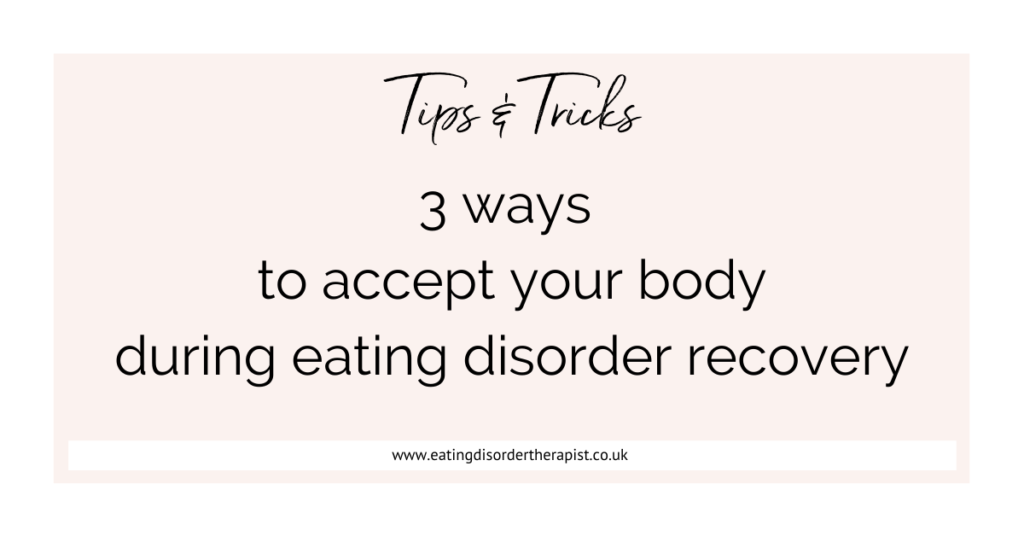Eating disorders are characterised by a pre-occupation with body shape and/or weight. It can be difficult to accept your changing body during recovery or that your body might be healthy at a weight higher than you would like. In fact, when my clients start work with me, most of them HATE their body; many over-exercise or starve their body as a punishment for it not looking how they think it should.
I want to share 3 things strategies that can help you to begin to feel better about your body during recovery.
That doesn’t mean that you need to LOVE your body and want parade around in your undies at every opportunity. Just feeling neutral or ‘okay’ about your body can open up so many more opportunities for you to live a fulfilling life.
Also, I think it’s important (and often difficult at first) to live in your body rather than viewing it as an object or something to be controlled! I hope that these strategies will help you to move closer to enjoying being in your body again.

1 – SWITCH YOUR ATTENTION from what your body looks or feels like to what it does for you.
This can help you to begin to appreciate your body and gain a more balanced perspective. We often take the functioning of our body for granted; being able to walk downstairs, being able to give someone a hug, or able to sing our favourite song at the top of our voices!
If you’re struggling to think of something that you appreciate about your body, Dr. Jessica Alleva suggests focusing on one of the following areas
1. Internal processes (e.g., “My body can absorb nutrients from food and heal from a cut”).
2. Physical capacities (e.g., “My body can do a yoga post this week that it couldn’t last week!”).
3. Bodily senses and sensations (e.g., “My body can feel comfort when wrapped up in a blanket and watching TV”).
4. Creative endeavors (e.g., “My body can paint a beautiful picture and play the guitar”).
5. Communication (e.g., “My body can tell others how I am feeling through body language”)
6. Self-care (e.g., “My body can relax and feel a massage”).
Try journaling what your body can do for 7 days; just complete the sentence “my body can…”. See how you feel at the end of the week compared to at the start.
Or you might like to set a reminder on your phone to check-in throughout the day and see what your body is doing for you. E.g., “I appreciate my body because I’m able to type quickly”. Or “I love that my body helps me to laugh while watching Friends”.
2 REMEMBER that thoughts aren’t facts!
Our thoughts and feelings can seem real, but they are just our interpretation of the world.
For example, you might think/feel like you’re fat even though other people have said that they’re worried about how thin you are, or they say that you look fine. I certainly know that I have been very critical of how I looked in certain photos, and then I look back on them a year later and see myself totally differently!
Sometimes our thoughts, feelings and behaviour get ‘fused’ together and we have difficulty seeing things another way. So you might see yourself in a photo, then get upset about how your body looks and these feelings impact on your eating. You can use a technique called cognitive defusion, to help in this situation.
Step 1. Just notice that you’re having a thought or feeling (e.g., my body is disgusting + a feeling of anxiety).
Step 2. Say to yourself “In this moment, I accept all of this” (pretend that you believe it even if you don’t).
Step 3. Breathe out and say “thankyou mind”.
This strategy takes practice, but can really help! I share this strategy with every client and they are skeptical at first, but then the following week, or maybe the week after that, they tell me that they tried cognitive defusion and it actually worked!
3 Be extra kind to yourself
“The motivation of self-compassion arises from love,
while the motivation of self-criticism arises from fear.
Love is more powerful than fear.”
Dr Kirstin Neff & Dr Christopher Germer
in The Mindful Self-Compassion Workbook
One way to be kinder is to listen to the words that you say to yourself and how you describe your body – e.g., “fatty”, “disgusting”, “a blob”. (I’ve heard a lot worse as well, so try not to judge yourself for what you have been saying).
Next ask yourself – “Would I say that to my best friend or a loved one?”.
The answer is probably NO!
You’d probably never dream of say the critical things that you say to yourself to a friend or loved one.
When you notice yourself speaking unkindly, take a moment to pause and instead think “What would I say to a friend who was struggling now?”.
Research suggests that those who are better able to show themselves compassion also have lower body image distress and dissatisfaction than people who are more critical of themselves.

Having trouble applying the strategies?
Book a FREE clarity call with Dr Rachel Evans.

[…] Check out Dr Evans’ blog on body acceptance: eatingdisordertherapist.co.uk […]
[…] My body is supporting me on this holiday. Research suggests that when we focus on what our body can do for us, rather than what it looks like then we develop a better relationship with our body. Your body is going a fantastic job and helping you make the most of your vacation, for example, feeling warm sand between your toes, or tasting delicious local food. Learn more in this blog post. […]